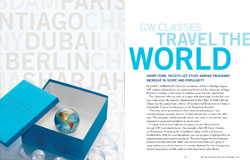GW Classes Travel the World
Short-term, faculty-led study abroad programs increase in scope and popularity
From the mountains of Peru to Trafalgar Square, GW students and professors are journeying far beyond the classrooms of Foggy Bottom to examine a wide range of academic issues through a global lens.
The University offers an array of courses with short-term, faculty-led overseas components, the majority administered by the Office of Study Abroad. Classes run the gamut from a Survey of International Economics in China to Sustainable Tourism Development in the Dominican Republic.
“This year, we’re sponsoring 23 short-term abroad programs,” says Lucienne Jugant, associate director of study abroad, who oversees the offerings. “The programs, which typically run for one week to one month, have increased in scope and popularity in recent years.”
A variety of short-term study abroad options are also offered directly through GW’s individual schools. One example is the GW Dean’s Scholars in Globalization Program in the Columbian College of Arts and Sciences. Established in 2004, the cross-disciplinary, two-year program is highlighted by an annual international research expedition. This past August, Steven Livingston, professor of media and public affairs and international affairs, led a group of rising sophomores to Latin America to examine firsthand the role of nongovernmental organizations and the media in redressing human rights abuses.
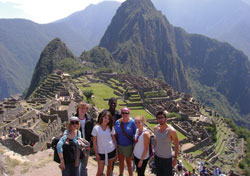
GW Dean’s Scholars in Globalization traveled to Latin America with Professor Steven Livingston last summer to study the role of NGOs and the media in redressing human rights abuses. Here, the group takes a break from their research to enjoy a cultural side trip to Machu Picchu, the ancient lost city of the Incas, located in the Andes Mountains of Peru.
“We spent a week in Chile and a week in Peru meeting with key players, including human rights workers and government officials, and visiting sites such as a laboratory in Santiago where forensic anthropologists use genetic testing to identify the remains of people killed by the military during Augusto Pinochet’s dictatorship,” Dr. Livingston says.
A highlight of the trip was attending the trial of former Peruvian President Alberto Fujimori, who is accused of corruption and human rights abuses. “At one point, we were no more than 20 feet away from him, and we spoke with one of the lead prosecutors the day before we attended the trial, as well as during the break. The access was just amazing,” Dr. Livingston says. The group also met with former Chilean President Eduardo Frei, who is now a senator, and observed the Senate in session.
“Another amazingly powerful experience was visiting the site in Santiago where Pinochet’s henchmen tortured people to death,” Dr. Livingston says. “When you stand in a somber place like that, you really come to appreciate what it means to be involved in a program that emphasizes human rights, both in words and in action. It’s incredible to get to know my students so well, introduce them to new ideas, and then take them to far-off places where they can see, touch, and feel what we were talking about. It’s really quite extraordinary and is certainly one of the highlights of my 20-year teaching career.”
Dr. Livingston and his group of Dean’s Scholars are now preparing for their second international study tour—a trip to Singapore in May. “Singapore presents a different set of challenges than what we saw in Latin America, since the nation state does not allow for free expression of ideas or for unfettered exercise of the practices of global civil society,” he explains. “It’s a wonderful opportunity for our students to experience a very different society than what they saw in Peru and Chile.”
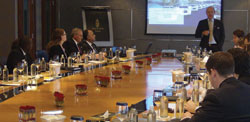
A highlight of the UAE study tour was a special presentation by Guy Crawford, CEO of the Dubai-based luxury hotel group Jumeirah International, in the Suha Boardroom of the world-famous Burj Al Arab Hotel. U.S. presidents are sometimes briefed in this boardroom during state visits to Dubai.
The United Arab Emirates was a fascinating destination this January for 20 GW MBA students, who traveled to Dubai with Professors of Marketing Salah Hassan and Robert Dyer for a rigorous Office of Study Abroad-sponsored program focusing on market behavior in the Middle East. “Dubai is considered a trend-setting test market for the Middle East region and is one of the most rapidly expanding cities in the world,” Dr. Hassan says. “Major multinational corporations and leading media and entertainment organizations consider the city their regional headquarters for business and trade.”
The 11-day study tour—which bridged two MBA marketing courses—featured visits to corporate and government offices throughout Dubai and presentations by top-ranked UAE cabinet ministers, business leaders, nonprofit directors, and educators. “Our students experienced a diverse itinerary that exposed them to the complexities of the global business environment, as well as the cultural, economic, and social issues facing Dubai,” Dr. Hassan says.
Participants also enjoyed VIP site visits to the emirates of Abu Dhabi and Sharjah, which UNESCO recently designated as “Cultural Capital of the Arab Region.” Sharjah (one of seven UAE emirates) recently launched a comprehensive campaign to promote the emirate as a sustainable cultural heritage destination inspired by its Arab and Islamic heritage. The study abroad delegation was escorted to Sharjah by top level executives for briefings by Hussain Al Mahmoudi, director general of the Sharjah Chamber of Commerce, and Marwan Al Sarkal, CEO of Al Qasba, an entertainment and cultural tourist attraction.
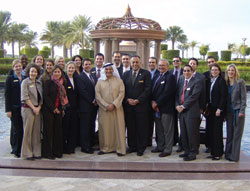
H.E. Anwar M. Gargash, BA ’81, MA ’84, UAE minister of state for foreign affairs (center), hosted GW MBA students and Professors of Marketing Salah Hassan and Robert Dyer for lunch and a roundtable discussion at the Emirates Palace in Abu Dhabi during the group’s January study tour.
For their culminating project, students were split into consulting teams and charged with developing a market and industry analysis and a market/business plan proposal, which they presented to a panel of experts. “The team projects centered on assisting firms active or interested in entering the Middle East market,” Dr. Hassan explains. “Our students came away from the program with a holistic understanding of the country and region as well as the ability to develop marketing strategies for multinationals. It was a unique learning experience for everyone involved.”
The boardrooms of London open their doors to GW students each summer for a popular graduate business course led by Jennifer Griffin, associate professor of strategic management and public policy. Students enjoy a privileged, behind-the-scenes look at corporate social impact policies and practices in the United Kingdom and the United States.
“It’s my favorite course of the year,” says Dr. Griffin, who has been taking her classes to London since 2005. “Our students are received with open arms. Executives of major corporations invite us into their London boardrooms to contribute to the worldwide conversation on corporate social responsibility, and they could not be more open. It’s an unforgettable experience that you just can’t teach in a classroom.”
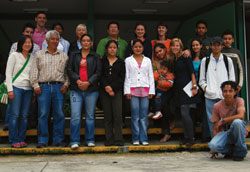
GSEHD Professor Judy Findlay led MA International Education students on a travel seminar to Mexico last August, where participants immersed themselves in the complex social, economic, and cultural issues shaping Mexican education. This year marks the 30th anniversary of the International Education Program’s study abroad series, which was launched in May 1979 with a trip to China led by Professor Dorothy Moore. Planning is now underway for the 2009 International Experiences Travel Seminar to either Bolivia or Turkey.
Mark Tenekjian
Dr. Griffin typically has waiting lists of 100 students annually for the course, which is capped at 20 participants. Highlights of last summer’s trip included visits to Royal Dutch Shell, British American Tobacco, Diageo, and SABMiller. “We focus on tobacco, petrochemical, and alcohol companies because their survival depends on how they manage their corporate impact,” Dr. Griffin says. “Diageo, which is the largest premium drinks company in the world, asked us to be their first focus group on attitudes toward alcohol, and they’ve invited us to return this spring for the next stage of their research.”
Across the North Sea, 15 Elliott School of International Affairs graduate students spent two weeks in Berlin last summer with Hope Harrison, associate professor of history and international affairs, for the powerful course History, Memory, and Politics in Berlin.
“Berlin is one of the cities in the world where history is most alive and fraught and difficult, so it is a perfect place to take students to witness the intersection between history and politics,” says Dr. Harrison, an expert on Berlin with high-level contacts throughout the city.
The group spent the first week looking at the Nazi period, World War II, and the Holocaust, while week two focused on the division of Germany, the Berlin Wall, and the East German regime. “We examined how Germans deal with these very difficult aspects of their history and how highly visible both periods continue to be in Berlin,” Dr. Harrison says.
Students gained valuable insights by meeting with prominent German politicians, academics, and museum heads, including the director of the Checkpoint Charlie Museum and the head of the memorial to the resistance. “There’s no question that one of the biggest highlights of the trip was meeting with three members of the Bundestag (German parliament) in the historic Reichstag building, who talked very movingly to us about their personal history of being forced to leave ancestral German lands in western Poland (Silesia) at the end of World War II,” Dr. Harrison says.
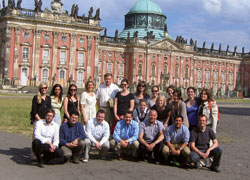
Professor Hope Harrison and her students enjoy a tour of the opulent Neues Palais in Potsdam, a suburb of Berlin.
Other memorable moments included a visit to the royal palaces in Potsdam, where the students talked at length with a professor of contemporary history about the complicated process of unifying East and West Germany, a tour of the former main prison of the East German Stasi (secret police), and a visit to the Sachsenhausen Concentration Camp on the outskirts of Berlin.
“The students came away with a firsthand understanding of the incredible amount of effort the Germans have put into dealing with their very difficult history,” Dr. Harrison says. “They don’t sweep it under the rug. Everywhere we looked, there were memorials, museums, and other efforts underway to come to terms with the past. I told my students before we left that this was not going to be a relaxing vacation, but a fascinating, life changing trip.”
The City of Lights becomes a vibrant classroom every summer for Mary Buckley, assistant professor of theater and dance, and 15 lucky students, who spend two weeks in Paris each June exploring modernism and the arts. “Paris is the perfect base for studying the roots of modernism in the early 20th century,” says Buckley, who defines modernism as “the forward-looking, Paris-based artistic and cultural movement that changed the course of art and thought in Europe.”
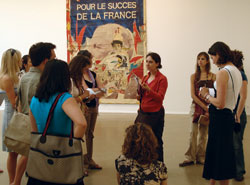
Mary Buckley and her students took in the treasures of the Musée d’Orsay during their two week trip to Paris to
study modernism.
The popular course, now entering its fourth year, veers away from the traditional tourist itinerary, taking students behind the scenes to “engage intellectually in the arts through the specific lens of modernism,” says Buckley, a professor of dance history. The group uses the museums and sites of Paris as resources, taking in the treasures of world famous venues like the Musée d’Orsay and the Museum of Modern Art, and enjoying live theater and dance performances throughout the city. “Students explore and contrast contemporary developments in dance, music, art, poetry, and repertory theater against the framework of modernist traditions,” Buckley explains. “It’s a very rich learning environment.”
A unique component of the class is face-to-face meetings with Parisian artists. Recent highlights included visits with two composers in their studios and an invitation to a pre-theater gathering at the home of a Parisian producer. “Every summer, we also spend time with artists at the National Center for Dance, a research and performing arts center, and enjoy a walking tour of Paris with a Sorbonne architecture professor, exploring the city from the grand old palace tradition through the broad boulevards and neoclassical design of Georges-Eugène Haussmann, up to contemporary times,” Buckley says.
The course culminates with a collaborative literary and photographic journal of the experience, exploring and documenting the contemporary artistic scene in Paris. “The students come away with a real sense of the history and culture of Paris through the arts and a deep appreciation for the value of art in their own lives,” Buckley says. “I think one of my students, a physics major, said it best when she called the course the best kept secret at GW.”
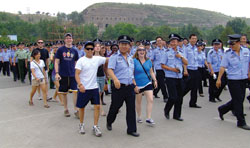
GW students march with a detachment of Chinese police practicing for the arrival of the Olympic torch outside the historic Yungang Buddhist caves near Datong, China, last July.
The wonders of China form the backdrop for Assistant Professor of Anthropology Robert J. Shepherd’s intensive summer abroad course, “Society, Culture, and Development in the People’s Republic of China.” Jointly sponsored by the University Honors Program and the Anthropology Department, the program includes four weeks in residence at the Beijing International Studies University and a fifth week in the field, studying development changes in China’s northwestern region.
Participants study Chinese four hours per day for a month in Beijing and spend two afternoons a week in class with Dr. Shepherd examining the development process in contemporary China. “China is arguably the most successful example of development in practice in the world, since the country is changing so quickly both socially and economically,” says Dr. Shepherd, who spent three years teaching at a United Nations educational training institute in Beijing earlier in his career. “It is, therefore, the perfect development case study for our students, who study the enormous cultural, social, and economic transformation first hand, and get an on-the-ground introduction to the complexities of life in China. Reading about it from Washington just doesn’t reflect the intensity of what’s happening there.”
Dr. Shepherd taps his expansive network of friends and associates in China to create an exceptional program for his students. “I invite speakers to our class to talk about the nuts and bolts of development in China, from the costs and benefits of leaving a state job for a private job, to becoming owners of their own apartments in a country where, 20 years ago, the government owned all the real estate,” he says. On free afternoons and weekends, he leads excursions to important cultural and historical sites around Beijing and further afield, such as the Great Wall, the Forbidden City, and the Temple of Heaven.
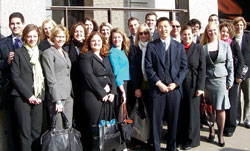
Professor Jennifer Griffin and a group of graduate business students in March visited London, where participants met with GW alumnus Sugheer Mufti, BBA ’79, MBA ’81, at financial services firm Citi London to discuss the global financial crisis and corporate responsibility initiatives. The group also visited GlaxoSmithKline and Diageo on the day of the company’s restructuring.
A veteran study abroad professor, Dr. Shepherd will take his third GW contingent to China this summer. He previously directed two study tours to China while teaching at George Mason University and was on the faculty of the Semester at Sea program. He says he is impressed by the maturity and focus of GW’s students as well as by the interdisciplinary scope of the course participants. “This program reflects the wide interest among our undergraduates in China and Asia,” he says. “China is so different from the United States. The participants come away from the experience much more reflective and with a real sense of personal accomplishment that is enormously helpful to their future intellectual work and research.”
This coming summer, GW professors will be jetting off with their classes to such far-flung destinations as Chennai, India, to study art therapy, South Africa to examine culture and music, Costa Rica to look at international education and policy, and Russia and Ukraine to probe media, power, and public opinion.
Jugant is already hard at work assembling short-term study abroad courses for summer 2010. “These are truly life-changing programs,” she says. “We look forward to making more and more of these amazing opportunities available to our students.”

